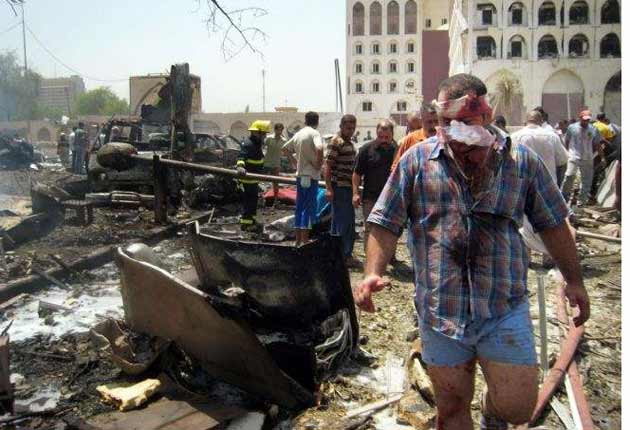Truck bombs bring carnage to Baghdad
Nearly 100 killed and hundreds more injured in Iraq's bloodiest day of the year

A series of blasts in Baghdad killed 95 people and wounded 536 in Iraq's bloodiest day this year, renewing doubts over the ability of Iraqi forces to maintain security after US troops pulled out of urban areas.
Baghdad's security spokesman made a rare admission of culpability after the attacks, in which at least six blasts struck near government ministries and other targets at the heart of Iraq's Shia-led administration. "This operation shows negligence, and is considered a security breach for which Iraqi forces must take most of the blame," Major-General Qassim al-Moussawi told Iraqiya state TV.
The government said this month that most of the city's blast walls would be removed within 40 days, a sign of confidence in its security forces after US combat troops withdrew from urban centres in June, ahead of elections due in January.
Yesterday's blasts were a rare example of a co-ordinated attack on heavily guarded targets. In one blast, a massive truck bomb close to a security checkpoint leading to the heavily fortified Green Zone blew out the windows of the nearby foreign ministry, sending shards of glass through busy offices, killing dozens of people.
"The windows of the foreign ministry shattered, slaughtering the people inside. I could see ministry workers, journalists and security guards among the dead," said a distraught employee who gave her name as Asia.
The attacks could undermine confidence in Prime Minister Nouri al-Maliki ahead of the parliamentary election. Yesterday's explosion was powerful enough to shatter some windows of Iraq's parliament building in the Green Zone.
"They are meant to convey a message to Iraqis and the world that insurgents are still there and can block the political process," said analyst Hameed Fadhel of Baghdad University. "Today's attacks reveal a major deficiency and weakness of the security forces. They were organised and huge," he added.
No group claimed responsibility, but General Moussawi said two members of al-Qa'ida were arrested when another car bomb was intercepted.
Sunni Islamist groups like al-Qai'da consider Shias to be heretics, and have been blamed for a series of blasts in the past two months at mostly Shia venues, such as mosques.
Another truck bomb in Baghdad's Waziriya district near the finance ministry killed at least 28 people and caused widespread destruction, police said, with part of a raised highway collapsing.
A separate explosion near the Reuters office in central Baghdad forced open windows and doors.
The Baghdad provincial government building came under mortar attack, police said, as did the Salhiya district in central Baghdad, home to army bases and a television station.
At least one suspected mortar landed near the United Nations compound in the Green Zone, startling UN workers marking the sixth anniversary of the destruction of their previous Baghdad headquarters by a truck bomb which killed envoy Sergio Vieira de Mello and other staff.
Iraqi officials have accused neighbouring states of fomenting violence in Iraq. Analysts say that could be a ploy to distract attention from domestic disputes and failings.
Join our commenting forum
Join thought-provoking conversations, follow other Independent readers and see their replies
Comments
Bookmark popover
Removed from bookmarks